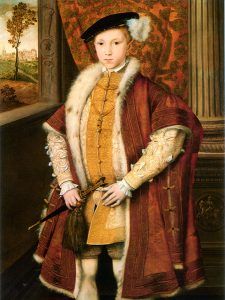
Citation: C N Trueman "Foreign Policy 1549 to 1553"
historylearningsite.co.uk . The History Learning Site, 17 Mar 2015 . 10 Sep 2024 .

By the fall of Edward Seymour, Duke of Somerset, England was in a precarious position with regards to her relationships in Europe. Scotland and France had been alienated. The Protestantism that had been developing in the Church of England had angered the Holy Roman Emperor, Charles V. Spain, along with its ardent Catholicism, had never forgiven England for its treatment of Catherine of Aragon. The Protestant states of northern Europe were barely in a position whereby they represented a major military bloc against the European catholic states. In fact, some of these Protestant states were as likely to rail against other Protestant states as the Luther versus Calvin issue took a hold.
England was in a weak position and Henry II wanted to exploit this. In August 1549 Henry declared war and took personal command of the siege of Boulogne. The French cut the lines of communication that had existed between Calais and Boulogne. However, an English naval victory over the French off of the Channel Islands ensured that Boulogne could be supplied and the commander there, Lord Huntingdon, managed to hold on.
Once again, Charles V played a decisive part – though in this case, it was by doing nothing. Henry II was always concerned that Charles V would intervene in favour of England, as the Emperor would not tolerate France taking control of an important port like Boulogne. In this case, Henry misjudged Charles who was more concerned about the growth of a Protestant Church in England. It is highly likely that Charles V would not have done anything to aid England in the autumn of 1549 – but this was a risk Henry II was not willing to take.
In January 1550, Dudley sent a delegation to France to negotiate a peace. The war with France had driven England to near bankruptcy and Dudley, the new leader of the Privy Council, knew that he had to negotiate with the French. Lord Russell led the English delegation. He was willing to negotiate away Boulogne for a full ransom but he also wanted to restart negotiations for a marriage between Edward VI and Mary, Queen of Scots. Henry II, knowing the weakness of the English position, would have nothing to do with this. Dudley, with the support of the Privy Council, agreed that the Treaty of Boulogne should be signed and it duly was on March 28 th 1550. France paid a ransom of 400,000 crowns and gained Boulogne. The French also agreed to remove all their remaining men from Scotland. The treaty also agreed to a perpetual defensive alliance between England and France. On April 25 th Boulogne was handed over to the French and the garrison there was sent to Calais.
The Treaty of Boulogne should have ended the problems for Dudley. They did not. Many in England believed the treaty to have been a national disgrace – a humiliating experience against a traditional enemy. Dudley’s position in the Privy Council was at risk – even though he had correctly ascertained that England was being pushed to bankruptcy by the war with France. Dudley believed that the handover of Boulogne was the lesser of the two evils and that national bankruptcy would have been a greater humiliation and one that would have been more exploited by England’s enemies.
Dudley did negotiate a marriage treaty with France. In this, Edward VI would marry Elizabeth, the daughter of Henry II, when she became twelve years old. France would get a dowry of 200,000 crowns. This agreement was ratified in December 1550 in return for a guarantee of English neutrality in continental wars.
Though this treaty may have pacified the French, it did a great deal to anger Charles V. English commercial contact with northern Europe had been guaranteed since 1496 with the ‘Intercursus Magnus’. Charles allowed this to breakdown. In April 1550, Charles ordered that the Catholic Inquisition in the Netherlands could arrest any heretic. This included foreigners. Charles did withdraw this addition of foreigners being arrested but his edict did force many in the Netherlands to flee to England for their own safety. This led to the collapse of the Antwerp cloth trade. Charles only diluted his edict in December 1550 when he believed that England would develop better trading relations with France at the expense of the Netherlands. ‘Normal’ trading relations were only established in June 1552.
Dudley had success in Scotland when in March 1552 an agreement was reached that established the border at the line where it had been before Henry VIII’s Scottish campaigns.
Dudley also encouraged explorers to search out new routes to develop trade. The Privy Council baulked at any expeditions in the southern Atlantic in case it provoked the Spanish. However, in 1552, a company was founded led by Sebastian Cabot to explore possible trade routes in the north Atlantic. Each member of the Privy Council invested £25 in the scheme. The company found a route to the port of Archangel in the White Sea and its leader, Richard Chancellor, established links with Ivan IV, the Tsar of Muscovy. In 1555 the Muscovy Company was founded which led to the development and modernisation of dockyards in England and an expansion and modernisation of the navy. The real benefit of this company to both England’s trade and prestige was only really apparent during the reign of Elizabeth I.
The death of Edward had European connotations. The accession of the Catholic Mary Tudor was well received by Charles V and the Habsburg in general as Mary was seen as being pro-Habsburgs. Henry II was less content as he believed that Mary’s succession would strengthen the hand of Charles in Europe at the expense of France. When it became clear that Mary would marry Philip of Spain, the son of Charles, Henry must have felt even more isolated.